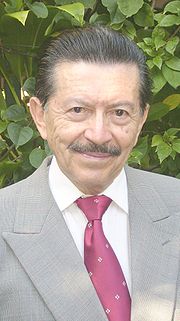
Martín Almada
Encyclopedia

Paraguay
Paraguay , officially the Republic of Paraguay , is a landlocked country in South America. It is bordered by Argentina to the south and southwest, Brazil to the east and northeast, and Bolivia to the northwest. Paraguay lies on both banks of the Paraguay River, which runs through the center of the...
. A noted dissident and human rights activist, he was a prisoner of the Alfredo Stroessner
Alfredo Stroessner
Alfredo Stroessner Matiauda, whose name is also spelled Strössner or Strößner , was a Paraguayan military officer and dictator from 1954 to 1989...
regime.
Biography
Almada was born in Puerto Sastre, but moved with his family to San LorenzoSan Lorenzo (Paraguay)
San Lorenzo is a city located in the Central Department in Paraguay, some 10 kilometers away from the capital Asunción. It is the third most populated city of Paraguay and its main activity is commerce. The National University of Asunción campus is located in San Lorenzo...
, near the capital Asunción
Asunción
Asunción is the capital and largest city of Paraguay.The "Ciudad de Asunción" is an autonomous capital district not part of any department. The metropolitan area, called Gran Asunción, includes the cities of San Lorenzo, Fernando de la Mora, Lambaré, Luque, Mariano Roque Alonso, Ñemby, San...
, when he was six. After he had finished his studies in educational science in 1963, he founded the educational institution "Juan Bautista Alberdi" in San Lorenzo and the "Centro de Animación Sociocultural". He then embarked on a law degree and graduated in 1968.
In 1972, he became the president of the association of educationalists of San Lorenzo, a local action group that received support by other sections of the society and positioned itself as an opposition of the dictatorship ruling Paraguay at the time.
At that time, Almada graduated at the University of La Plata in Argentina as a doctor of educational science. His thesis on education in his home country was sent to the government in Paraguay (an act of information exchange a part of Operation Condor
Operation Condor
Operation Condor , was a campaign of political repression involving assassination and intelligence operations officially implemented in 1975 by the right-wing dictatorships of the Southern Cone of South America...
). As a result, Almada's work was rejected by the regime of Alfredo Stroessner
Alfredo Stroessner
Alfredo Stroessner Matiauda, whose name is also spelled Strössner or Strößner , was a Paraguayan military officer and dictator from 1954 to 1989...
, his wife was killed, as were two of his followers. He himself was imprisoned as a political enemy in 1974, nearly tortured to death, and kept in prison for about three and a half years. His wife, in house arrest, was forced to hear through a telephone her husband's cries as he was tortured. She died after the political police falsely told her Martìn had died and "presented" her a loincloth covered with blood with nails they said where used to remove his fingernails.
A campaign by Amnesty International
Amnesty International
Amnesty International is an international non-governmental organisation whose stated mission is "to conduct research and generate action to prevent and end grave abuses of human rights, and to demand justice for those whose rights have been violated."Following a publication of Peter Benenson's...
resulted in Almada's release in 1977. He went into exile with his mother and his children, at first in Panama
Panama
Panama , officially the Republic of Panama , is the southernmost country of Central America. Situated on the isthmus connecting North and South America, it is bordered by Costa Rica to the northwest, Colombia to the southeast, the Caribbean Sea to the north and the Pacific Ocean to the south. The...
, and wrote a book Paraguay: The Forgotten Jail, the Country in Exile about torture and, most importantly, the torturers, whose name and faces he well remembers, and the extensive network of corruption through which the country was "run" by a dictatorship dedicated to an absurd anti-communism
Anti-communism
Anti-communism is opposition to communism. Organized anti-communism developed in reaction to the rise of communism, especially after the 1917 October Revolution in Russia and the beginning of the Cold War in 1947.-Objections to communist theory:...
in the practical absence of any communist movement worth speaking of, actually a mask for the suppression of any even marginally left-leaning idea or practice. Almada's book, a sobering read definitely not for the squeamish, raised debate about human rights
Human rights
Human rights are "commonly understood as inalienable fundamental rights to which a person is inherently entitled simply because she or he is a human being." Human rights are thus conceived as universal and egalitarian . These rights may exist as natural rights or as legal rights, in both national...
all over the world. In 1986, he worked UNESCO
UNESCO
The United Nations Educational, Scientific and Cultural Organization is a specialized agency of the United Nations...
until 1992, when he returned to Paraguay. There he concentrated on the publication of papers of the dictatorship that reveal its repression and torture and in 1992, he finally uncovered the ”Terror archives
Terror archives
The "Archives of Terror" were found on December 22, 1992, by a lawyer, Dr. Martín Almada, and a human-rights activist and judge, José Agustín Fernández, in a police station in a suburb of Asunción , capital of Paraguay. Fernández was looking for files on a former prisoner...
”.
He received several awards for his courage and work, including the prize "Antorcha a la libertad” of the Libre Foundation in Asunción in 1999 and the Right Livelihood Award
Right Livelihood Award
The Right Livelihood Award, also referred to as the "Alternative Nobel Prize", is a prestigious international award to honour those "working on practical and exemplary solutions to the most urgent challenges facing the world today". The prize was established in 1980 by Jakob von Uexkull, and is...
in 2002.

